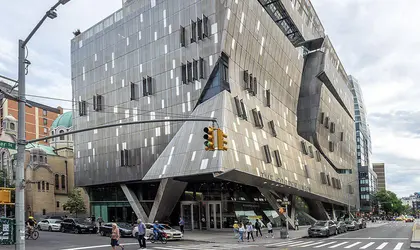Parallel to the war in the trenches, there is a culture war, a war of the minds. In Ukraine, that war is over, as nobody seems to enjoy anything Russian there. In New York, the scene is different, with every cultural institution weighing whether anything Russian should be on display. In these debates, Russian acolytes try to make their nation shine through highbrow culture. Similar to the campaign of letting Russian athletes participate in the Olympics, it’s a cultural war targeting our minds, with the aim of inducing U.S. politicians to curtail their financial and military support for Ukraine. They call it “soft power.”
Last week I took a stand in one of these debates. The prestigious Cooper Union School of Architecture had decided to put up an extensive exhibition on Soviet architecture entitled “Vkhutemas: Laboratory of the avant-garde, 1920-1930.” It enraged the Ukrainians. The Cooper Union is located in the midst of what is known as the Ukrainian Village in Manhattan. The Architecture School is surrounded by churches, a synagogue, a school, and a museum devoted to everything Ukrainian. So no wonder the Ukrainians were upset. I wrote an op-ed about it, and The Cooper Union leadership was hammered with compelling emails, all of which led them to postpone the show. It was a wise decision.
JOIN US ON TELEGRAM
Follow our coverage of the war on the @Kyivpost_official.

The Cooper Union building overshadowing St. George’s Ukrainian Catholic Church in Manhattan’s Ukrainian Village:Source image courtesy of Wikimedia Commons user Ajay Suresh. (CC BY 2.0)
That could have been the end of the story. But no. In the last week, hundreds of anonymous trolls favoring the Russians came out of the woodwork hammering me on social media, which is fine. I can take a hit for the team. At the same time, the news site I published my op-ed in had to take down part of it due to severe legal threats. Using lawyers against free speech is a well-known tactic in the United States to stop the spread of uncomfortable facts. These are some of the facts that were removed: the research behind the Vkhutemas exhibit benefited from the direct intellectual patronage of a famous Russian architect and former President of the Russian Union of Architects. He was the cornerstone of architectural practice and planning in Putin’s regime before the war. Unfortunately, he is also the leading architect for the murderous Chechen President Ramzan Kadyrov and designed his massive Sports Complex in Grozny. He and the exhibit curator are noticeably absent from the list of over 6,700 brave Russian architects who, at the risk of prosecution, signed an open letter against the war.
The facts about the social connections of the Vkhutemas exhibition could not see the light of day. Unscrupulous lawyers made sure the journal would censor them. Then the social media trolls began moving. Attacking the messenger instead of the message is a clever strategy. It creates a net of suspicion around the author, drawing attention away from the real news.
At the same time, hundreds of esteemed academic historians and architecture professors began to mobilize in favor of the exhibition. Many of them belong to scholars within the frustrated and disenfranchised group of Russian Studies, none of them seems to represent the Ukrainian side. They wrote an open letter to the Cooper Union leadership arguing that canceling the show would be “a chilling impingement on academic freedom and education” and “a troubling instance of censorship and historical erasure.”
Besides, Vkhutemas was 100 years ago, they pointed out, and should not be conflated “with the actions of the Russian regime today.”
Right. I wonder if the same respected scholars would be willing to entertain a similar line of argument about the history of slavery, colonial architecture, the oppression of indigenous peoples, or the relevance of African history. We tell and retell these stories because they reflect socio-political issues and aspirations we struggle with today. All histories are mediations on current affairs. To detach history from the present is, at best, naive or, more likely, ignorant when concerned with the soft power of storytelling.
Yet the open letter seems to support the Ukrainians: “We stand in full solidarity with the people of Ukraine and all those who oppose Russia’s unjustified and brutal invasion,” they stated. When push comes to shove, these turn out to be empty words. To “stand in full solidarity” means more than just signing some highbrow open letter. Try instead, as I have done, sitting next to Cooper Union’s neighbors in the Ukrainian Village. Feel their outrage and emotional pain. An exhibition that is even remotely favorable to anything Russian in the midst of their community is nothing but an insult. And you don’t insult your neighbors, do you?
This is the second time the Vkhutemas exhibition in New York has been postponed due to the war. And the message of its inappropriateness seems to finally be seeping in. It may be time to admit a mistake. The curators appear to be working on that, having now begun utterly revising the history of the Vkhutemas School as favoring democracy and all things Ukrainian.
I can’t help being suspicious, given the violent history of communism in the period. Did Vkhutemas pedagogues support democracy, independence, and freedom of expression? Is it historically accurate or an act of appropriation to describe some of their students and staff as Ukrainians?
Revisionist history can be exciting and refreshing. But please note that neither The Cooper Union folks nor I should be the judge of this modification. That belongs to the university’s Ukrainians neighbors. They are the most impacted. So please, Cooper Union, “stand in full solidarity with the people of Ukraine” and give them a significant voice in telling Soviet architectural history.
You can also highlight the text and press Ctrl + Enter



